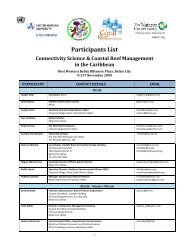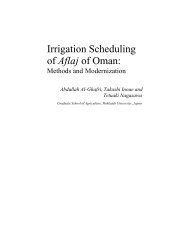The Global Water Crisis: Addressing an Urgent Security - Unu-inweh ...
The Global Water Crisis: Addressing an Urgent Security - Unu-inweh ...
The Global Water Crisis: Addressing an Urgent Security - Unu-inweh ...
You also want an ePaper? Increase the reach of your titles
YUMPU automatically turns print PDFs into web optimized ePapers that Google loves.
Ethical considerations also need to be taken into account in order to ensure equitable access <strong>an</strong>d sufficient provision<br />
of water to all, particularly to marginalized groups who often have no say in the decision-making process. However,<br />
establishing a basic constitutional right to water come with its own limitations <strong>an</strong>d implications, <strong>an</strong>d c<strong>an</strong> erroneously be<br />
seen as the magic silver bullet that will address m<strong>an</strong>y of the issues related to the water crisis.<br />
What has also become clear is that there currently is a vacuum in international water leadership. New forms of hydrodiplomacy<br />
are desperately needed in order to address the lack of political will, fin<strong>an</strong>cial resources <strong>an</strong>d effective govern<strong>an</strong>ce.<br />
Although leaders <strong>an</strong>d policy-makers are increasingly inundated by ‘legislative congestion’, the fact remains that inactivity<br />
in the face of a growing global water crisis c<strong>an</strong>not go ignored. Future generations trust us to get it right; they will drink<br />
the very same water we drink. <strong>The</strong>re is, therefore, considerable urgency in creating the political will to address the root<br />
causes of the global water crisis.<br />
2. <strong>The</strong>re Is Hope: Challenges <strong>an</strong>d Opportunities<br />
Growing populations, ch<strong>an</strong>ging diets, increased urb<strong>an</strong>, agricultural <strong>an</strong>d industrial water dem<strong>an</strong>ds, <strong>an</strong>d a growing<br />
underst<strong>an</strong>ding of nature’s need for water require that we radically reform our attitude toward water <strong>an</strong>d how it is m<strong>an</strong>aged<br />
globally. <strong>Water</strong> needs to be on the global political agenda not only in order to feed the projected 9 billion people that<br />
will inhabit the earth by 2050 with less agricultural water th<strong>an</strong> is available today, but also in order to address the critical<br />
development challenge of doing so in a safe, sustainable way without compromising water resources that are essential<br />
to ecosystem services <strong>an</strong>d functions. By addressing critical water issues, we will simult<strong>an</strong>eously address economic <strong>an</strong>d<br />
public health woes while adv<strong>an</strong>cing our capacity to adapt to climate ch<strong>an</strong>ge. <strong>Addressing</strong> water security issues will create<br />
a foundation for peace <strong>an</strong>d well-being.<br />
What’s more, not all solutions will require large amounts of funding. On the contrary: fin<strong>an</strong>ce ministers may be inclined<br />
to action if they knew that inadequately addressing water <strong>an</strong>d s<strong>an</strong>itation issues was costing them a signific<strong>an</strong>t portion<br />
of their country’s GDP. However, having said that, the resolution of the global water crisis will require a level of funding<br />
commensurate with the seriousness of the problem. Despite the critical need, investment in water m<strong>an</strong>agement has<br />
dropped by more th<strong>an</strong> 25% in most countries since the late 1990s (World B<strong>an</strong>k, 2010). <strong>The</strong>re is a disturbing mismatch<br />
between investment in the form of aid <strong>an</strong>d results. Too often, there is a focus on water treatment at the expense of<br />
providing basic services in the areas where it is most needed. Achieving the target for both water supply <strong>an</strong>d s<strong>an</strong>itation<br />
would bring economic benefits: investing US $1 would give <strong>an</strong> economic return of US $3-$4, depending on the region.<br />
Achieving this target would require <strong>an</strong> estimated additional investment of around US $11.3 billion per year over <strong>an</strong>d<br />
above current investments (World Health Org<strong>an</strong>ization, 2012), <strong>an</strong> amount far less th<strong>an</strong> the <strong>an</strong>nual military budgets of<br />
m<strong>an</strong>y developed countries.<br />
Money alone though will not be enough to solve all the problems. In m<strong>an</strong>y countries, major public institutions do not have<br />
the capacity to address water issues even if sufficient funding is available. Help from other countries as well as fin<strong>an</strong>cing<br />
are required to ensure that water quality <strong>an</strong>d availability issues do not stall economic or social progress or, worse yet,<br />
result in further conflict in m<strong>an</strong>y parts of the world. Development cooperation also needs to be encouraged in order to<br />
ensure that it includes all economic flows, <strong>an</strong>d not just direct aid.<br />
It will also be import<strong>an</strong>t to support <strong>an</strong>d adv<strong>an</strong>ce established United Nations international water protocols in order to<br />
make further adv<strong>an</strong>ces in water security. <strong>The</strong> InterAction Council was informed that the UN has already devised a Legal<br />
Analytical Framework for water security, but that this is not being met by m<strong>an</strong>y countries (Wouters et al., 2009). On the<br />
other h<strong>an</strong>d, <strong>an</strong> example of real progress toward higher international st<strong>an</strong>dards of water m<strong>an</strong>agement is the 1997 UN<br />
<strong>Water</strong>courses Convention. Unfortunately, m<strong>an</strong>y nations have yet to ratify this treaty.<br />
Regional cooperation is essential to creating tr<strong>an</strong>sboundary relationships that result in optimal levels of water, food <strong>an</strong>d<br />
health security for all users sharing a particular river system. International examples, such as that of the Nile River Basin,<br />
suggest that effectively orchestrated basin-scale m<strong>an</strong>agement of water resources c<strong>an</strong> generate increased benefits for all<br />
within a regional context if there is cooperation between all stakeholders. Other globally relev<strong>an</strong>t models also exist, such<br />
as C<strong>an</strong>ada’s Northwest Territories ‘Northern <strong>Water</strong>s, Northern Voices’ water stewardship strategy, which demonstrates<br />
how the rights of both people <strong>an</strong>d nature to water c<strong>an</strong> be a foundation of sustainable economic development.<br />
4 <strong>The</strong> <strong>Global</strong> <strong>Water</strong> <strong>Crisis</strong>: <strong>Addressing</strong> <strong>an</strong> <strong>Urgent</strong> <strong>Security</strong> Issue




